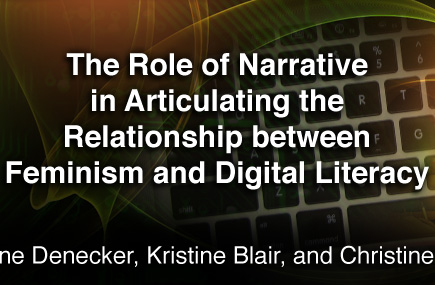References
Alexander, Jonathan. (2006). Digital youth: Emerging literacies on the world wide web. Cresskill, NJ: Hampton.
American Association of University Women (AAUW). (2000). Tech savvy: Educating girls in the new computer age. Washington, DC: AAUW.
Andrews, William L. (1986). To tell a free story: The first century of Afro-American autobiography, 1760-1865. Chicago, University of Illinois Press.
Baker, Sarah. (2001). 'Rock on, baby!': Pre-teen girls and popular music. Continuum: Journal of Media and Cultural Studies, 15(3), 359–371.
Bamberg, Michael G.W. (1997). Positioning between structure and performance. Journal of Narrative and Life History, 7(1-4), 335-342.
Blair, Kristine. (2008). Kristine Blair's literacy narrative. Digital Archive of Literacy Narratives. Retrieved from: http://hdl.handle.net/2374.DALN/12.
Blackburn, Jessie. (2009). Reading and Motherhood. Digital Archive of Literacy Narratives. Retrieved from: http://hdl.handle.net/2374.DALN/585.
Blair, Kristine, & Takayoshi, Pamela. (1999). Feminist Cyberscapes. Stamford, CT: Ablex.
Blair, Kristine, & Tulley, Christine. (2007). Whose research is it anyway?: The challenge of deploying feminist methodology in technological spaces. In Heidi A. McKee & Danielle Nicole DeVoss (Eds.), Digital writing research: Technologies, methodologies, and ethical Issues (pp. 303-318). Cresskill, New Jersey: Hampton Press.
Bloome, David. (2012). Five ways to read a curated archive of digital literacy narratives. In H. L. Ulman, S. L. DeWitt, & C. L. Selfe (Eds.), Stories that Speak to Us: Exhibits from the Digital Archive of Literacy Narratives. Logan, UT: Computers and Composition Digital Press/Utah State University Press. Retrieved from: EDITORIAL NOTE:STSTU URL.
Brandt, Deborah. (1998). Sponsors of literacy. College Composition and Communication, 49(2), 165-185.
Bruner, Jerome. (1991). Self-making and world-making. Journal of Aesthetic Education, 25(1), 67-78.
Carr, Nicholas. (July 2008). Is Google making us stupid? Atlantic Monthly.
Carr, Nicholas. (2010). The Shallows: What the Internet is Doing to Our Brain. New York: W.W. Norton.
Cox, Ana Marie, Johnson, Freya, Newitz, Annalee, & Sandell, Jillian. (1997). Masculinity without men: Women reconciling feminism and male-identification. In Leslie Heywood & Jennifer Drake (Eds.), Third wave agenda: Being feminist, doing feminism (pp. 178-206). Minneapolis: University of Minnesota Press.
Daley, Elizabeth. (2003). Expanding the concept of literacy. EDUCAUSE, March/April, 33-40.
DeLamater, John D., & Hyde, Janet S. (1998). Essentialism vs. social constructionism in the study of human sexuality. Journal of Sex Research, 35(1), 10-18.
Drew, Benjamin. (1856). A North-Side view of slavery: The refugee: Or the narratives of fugitive slaves in Canada. Related by themselves, with an account of the history and condition of the colored population of Upper Canada. Boston: J.P. Jewitt & Co.
Douglass, F. Narrative of the life of Frederick Douglass: An American slave written himself with related documents (D. Blight, Ed.). (2003). New York: Bedford/St. Martin's.
Gee, James. (2005). What video games have to teach us about learning and literacy. London: Palgrave.
Gergen, Kenneth, & Gergen, Mary. (1988). Narratives and the self. In Berkowitz, Leonard (ed.). Advances in Experimental Social Psychology: Social Psychological Studies of the Self. (pp. 17-63). San Diego: Academic Press.
Glenn, Cheryl. (1997). Rhetoric Retold. Carbondale: Southern Illinois University Press.
Grimes, William. (1825). Life of William Grimes the runaway slave. Written by himself. New York. Retrieved June 20, 2010 from http://docsouth.unc.edu/neh/grimes25/grimes25.html
Gruber, Sibylle, & Boreen, Jean. (2003). Teaching critical thinking: using experience to promote learning in middle school and college students. Teacher and Teaching: theory and practice, 9(1).
Haraway, Donna. (1985). A cyborg manifesto: Science, technology, and socialist-feminism in the late twentieth century. Socialist Review, 80, 65-108.
Haas, Angela, Tulley, Christine, & Blair, Kristine. (2002). Mentors versus masters: Women’s and girls’ narratives of (re)negotiation in web-based writing spaces. Computers and Composition, 19(3), 231-249.
Haswell, Richard H., & Liu, Min-Zhan. (1998). Comp Tales. Portsmouth, NH: Heinemann.
Hawisher, Gail. (2008). Gail Hawisher literacy narrative. Digital Archive of Literacy Narratives. Retrieved from: http://hdl.handle.net/2374.DALN/14.
Hawisher, Gail, LeBlanc, Paul, Moran, Charles, and Selfe, Cynthia L. (1996). Computers and the teaching of writing in American higher education: 1979-1996: A history. Stamford, CT: Ablex.
Hawisher, Gail E., & Sullivan, Patricia. (1998). Women on the networks: Searching for E-spaces of their own. In Susan Jarratt & Lynn Worsham (Eds.), Feminism and composition studies: In other words (pp. 172–197). New York: Modern Language Association.
Handa, Carolyn. (1990). Computers and community: Teaching composition in the 21st-Century. Portsmouth, NH: Heinemann.
Heilbrun, Carolyn G. (1988). Writing a woman’s life. New York, NY: Ballantine Books.
Heywood, Leslie, & Drake, Jennifer. (1997a). Introduction. In Leslie Heywood, & Jennifer Drake (Eds.), Third wave agenda: Being feminist, doing feminism (pp. 1-24). Minneapolis: University of Minnesota Press.
Heywood, Leslie, & Drake, Jennifer. (1997b). We learn America like a script: Activism in the third wave; or, enough phantoms of nothing. In Leslie Heywood & Jennifer Drake (Eds.), Third wave agenda: Being feminist, doing feminism (pp. 40-54). Minneapolis: University of Minnesota Press.
Hertz, Rosanna. (1997). Reflexivity and Voice. Thousand Oaks, CA: Sage Publications.
Inman, James A. (2004). Computers and Writing: The Cyborg Era. Mahwah, NJ: Lawrence Erlbaum.
Irvine, Janice M. (1990). Disorders of desire: Sex and gender in modern American sexology. Philadelphia: Temple University Press.
Järvinen, Margaretha. (2004). Life histories and the perspective of the present. Narrative Inquiry 14(1), 45-68.
Kitalong, Karla, Bridgeford, Tracy, Moore, Michael, & Selfe, Dickie. (2003). Variations on a theme: The technology autobiography as a versatile writing assignment. In Pamela Takayoshi & Brian Huot (Eds.), Teaching writing with computers: An introduction (pp. 219-233). Boston: Houghton Mifflin.
LaClau, Ernesto, & Mouffe, Chantal. (2001). Hegemony and Socialist strategy: Towards a radical Democratic politics. New York: Verso.
Maher, Frances A. (1999). Progressive education and feminist pedagogies: Issues in gender, power, and authority. Teachers College Record 10(1).
Matthews, Victoria. (2004). Introduction. In Henry Louis Gates & Nellie McKay (Eds.), The Norton Anthology of African American Literature. (p. xxxvii). New York: W.W. Norton & Co.
Morrison, Toni. (1987). The site of memory. In Zinsser, William K. (Ed.). (1998). Inventing the truth: The art and craft of memoir. (pp. 183-201). New York: Houghton Mifflin, Co.
Mulvey, Laura. (1975). Visual pleasure and narrative cinema. Screen 16, 6-18.
Naples, Nancy. (2003). Feminism and method: ethnography, discourse analysis, and activist research. New York: Routledge.
North American Slave Narratives. (2010). Retrieved June 20, 2010, from Documenting the American South Website: http://docsouth.unc.edu/neh/
Panter, Paige. (2009). Music Story. Digital Archive of Literacy Narratives. Retrieved from: http://hdl.handle.net/2374.DALN/903.
Puri, Jyoti. (1999). Woman, body, desire in post-colonial India: Narratives of gender and sexuality. London: Routledge.
Rheingold, Howard. (1993). The virtual community: Homesteading on the electronic frontier. Cambridge: MIT Press.
Rohan, Liz. (2009). Writing about Boys. Digital Archive of Literacy Narratives. Retrieved from: http://hdl.handle.net/2374.DALN/147.
Ronald, Kate, & Ritchie, Joy, eds. (2006). Teaching rhetorica: Theory, pedagogy, practice. Portsmouth, NH: Heinemann.
Selber, Stuart. (2004). Multiliteracies for a digital age. Carbondale: Southern Illinois University Press.
Selfe, Cynthia L. (1999). Technology and literacy: A story about the perils of not paying attention. College Composition and Communication, 50, 411–436.
Selfe, Cynthia, & Hawisher, Gail. (2004). Literate lives in the information age: Narratives of literacy from the United States. Mahwah, NJ: Lawrence Erlbaum.
Selfe, Cynthia, & The DALN Consortium. (2012). Narrative theory and stories that speak to us. In H. L. Ulman, S. L. DeWitt, & C. L. Selfe (Eds.), Stories that Speak to Us: Exhibits from the Digital Archive of Literacy Narratives. Logan, UT: Computers and Composition Digital Press/Utah State University Press. Retrieved from: EDITORIAL NOTE:STSTU URL.
Stabile, Carol. (1994). Feminism and the technological fix. London, UK: Manchester University Press.
Tulley, Christine. (2011). IText reconfigured: The rise of the podcast. Journal of Business and Scientific Communication, 25(3), 40-61.
Walker, Alice. (1983). In search of our mothers' gardens: Womanist prose. San Diego: Harcourt, Brace, and Company.
Walter, Pierre. (1999). Defining literacy and its consequences in the developing world. International Journal of Lifelong Education 18(1).
Wajcman, Judy. (2003). TechnoFeminism. Cambridge: Polity Press.
Williams, Hazel. (2010). Language as an Expression of Culture. Digital Archive of Literacy Narratives. Retrieved from: http://hdl.handle.net/2374.DALN/1069.
Wood, Andrew F. & Fassett, Deanna L. (2003). Remote control: Identity, power, and technology in the communication classroom. Communication Education 52(3/4), 286-296.
Young, Jeffrey R. (15 August 2010). College 2.0: Teachers without technology strike back. Chronicle of Higher Education.
Zuss, Mark. (1997). Contesting representations. Theory & Psychology, 7(5), 653-673.


